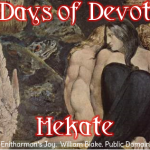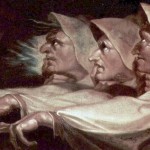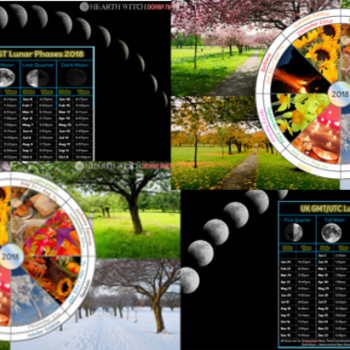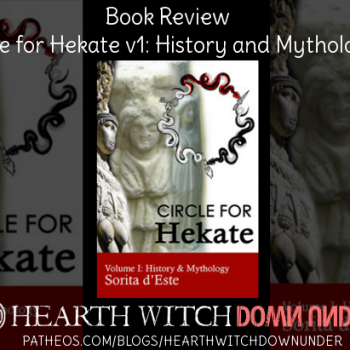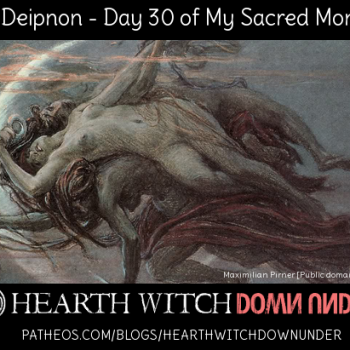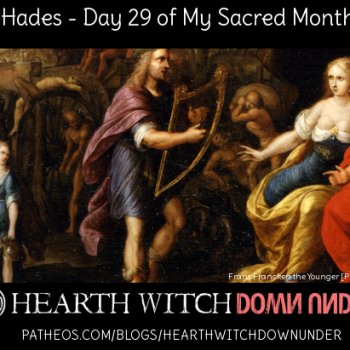This post is part of a blog challenge series, 30 Days of Devotion to Hekate. Day 8 and we are looking the variations of Hekate, Her aspects and regional forms.
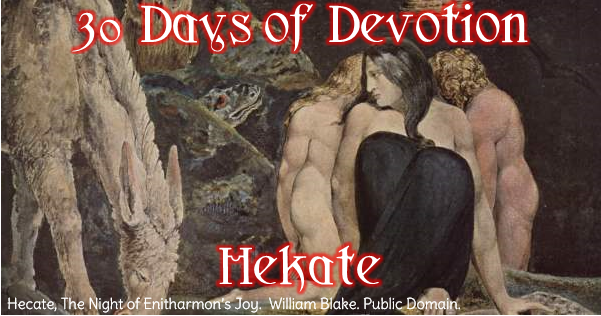
This is a difficult one. By itself it seems simple enough, but when you look at the other topics in this series this one becomes difficult. I just did a post on names and epithets – which discusses aspects. And upcoming, day 12, I am supposed to discuss places associated with Hekate, which surely will take in regional forms as well.
I have to be honest here, I notice this problem more than once in this series. Tomorrow I will be doing Common Mistakes about Hekate, and I have merged that with what would have been day 25, worst misconceptions because, they are basically the same thing! I am beginning to feel a little annoyed with this series because of these problems. I think the real problem is that we have a list of topic prompts, but no information as to what the original poster of this list actually meant by the prompts.
Well, I didn’t look at all of Hekate’s names and epithets yesterday, so I suppose looking at Her aspects shouldn’t be too much of a problem, there are many to choose from after all. But I will ignore the whole regional forms thing in favour of day 12.
Domestic Goddess
This is an oddly lesser known aspect of Hekate, Her role in the home. In Athens it is stated that nearly every house had a shrine to Her, a Hekataion, just outside their front door. This is where many would leave the Deipnon offering to Her and the dead, if they weren’t leaving it at the crossroads.
As The One Before the Gates, and Keeper of the Keys, She is of course a Goddess of boundaries and protector of them as well. Thus it is that Hekate is the protector of the home, She is the one to call on (along with Hermes) for home security purposes.
For the Deipnon it is common to leave out for Her supper not just food offerings, but also the sweepings from your home, altar and shrines. Ashes, food from the floor, dust and dirt. An odd offering I admit, but it is what we do. This is part of the process of getting rid of the old and making room for the new – an integral part of the dark moon, and fitting in Her role as Goddess of the Crossroads, moving from one path to a new one as it were.
Being Kleidoukhos, Nurse to the Young, also brings Hekate into a more domestic role as well – since if you have children, then caring for them is part of the domestic role that we take on in our homes and as parents.
Oceanic Goddess
Another aspect that I rarely see mentioned, and in truth know little about so I am having to study this as I write. In the Orphic hymn to Hekate She is named Einalian, which means ‘of the sea’. And of course there are multiple mentions of Her dominion over the sea in Theogony.
“And she [Asteria] conceived and bare Hecate whom Zeus the son of Cronos honoured above all. He gave her splendid gifts, to have a share of the earth and the unfruitful sea.[…]
For as many as were born of Earth and Ocean amongst all these she has her due portion. The son of Cronos did her no wrong nor took anything away of all that was her portion among the former Titan gods: but she holds, as the division was at the first from the beginning, privilege both in earth, and in heaven, and in sea. Also, because she is an only child, the goddess receives not less honour, but much more still, for Zeus honours her.[…]
[…]and to those whose business is in the grey discomfortable sea, and who pray to Hecate and the loud-crashing Earth-Shaker, easily the glorious goddess gives great catch, and easily she takes it away as soon as seen, if so she will.”
From this we can see that Hekate, along with Poseidon (Earth-Shaker) is one to call on for help in getting a good catch when fishing at sea, but She can also have the opposite effect and make sure you catch nothing. It should also be noted that one of Her sacred animals is a fish, the red mullet to be specific, and is a fitting offering to Her.
We can assume that Hekates dominion over the sea comes, in part, from Her grandmother Eurybia who is the Goddess of the power over and mastery of the sea. Eurybia is also the daughter of Pontus who IS the sea. So we can see here a direct family line leading to Hekate. As the conflated mother of Scylla, who is a sea monster, we see another familial connection to the sea.
And we should probably discuss the conflation itself of Hekate with Scyllas mother Crataeis who is, under Her usual name of Keto, a sea Goddess in Her own right – specifically the Goddess of the dangers of the sea and of sea monsters, such as Scylla obviously, but also sharks and whales and the like.
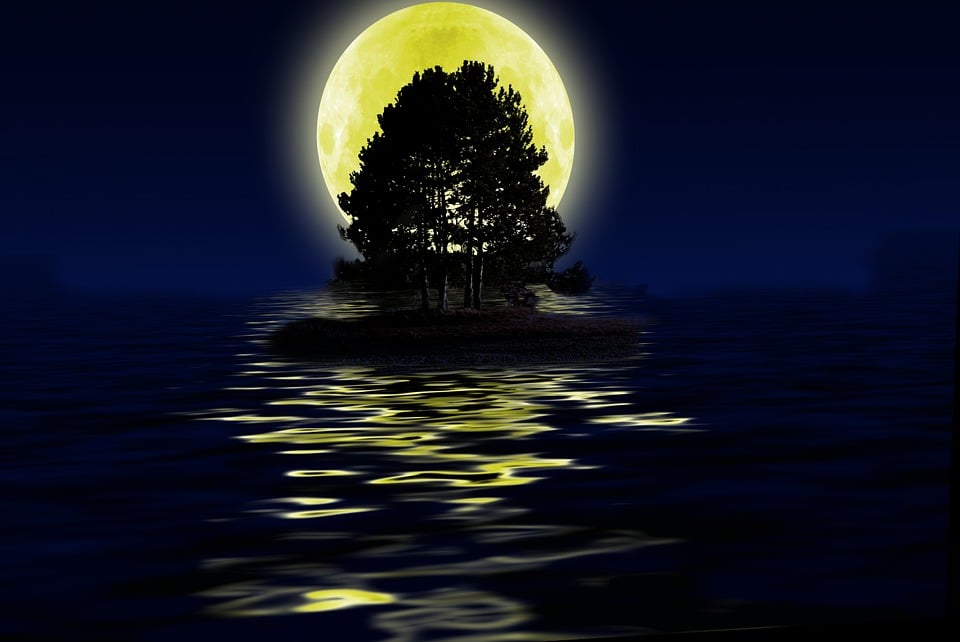
Ouranic Goddess
Not much is ever written about Hekate as a Ouranic (sky, heavens) Goddess, but She is one. In the Orphic hymn She is named Ourania, and of course there is mention of Her dominion over the heavens in Theogony.
Orphic hymn – “[…]lovely dame, of earthly, watery, and celestial frame[…]”
Theogony – “She received honour also in starry heaven, and is honoured exceedingly by the deathless gods.[…]
[…]but she holds, as the division was at the first from the beginning, privilege both in earth, and in heaven, and in sea.”
Asteria, Hekates mother, is the Starry One and She is the Goddess of night divination – dreams and astrology and the like. Hekate obviously inherits certain of Her witchcraft aspects from Her mother, and it stands to reason that She would inherit some of the heavens as well.
We know, of course, that Hekate is a lunar Goddess, of the dark/new moon, and She is often depicted with a crescent moon. We can assume the moon is a Ouranic body, being a heavenly body but there is some mention of it perhaps being a Chthonic body since it is “another earth”. Personally I consider it purely Ouranic and connect it to Hekates Ouranic aspects – but YMMV.
30 Days of Deity Devotion
1 – A basic introduction of the deity
2 – How did you become first aware of this deity?
3 – Symbols and icons of this deity
4 – A favourite myth or myths of this deity
5 – Members of the family – genealogical connections
6 – Other related deities and entities associated with this deity
7 – Names and epithets
8 – Variations on this deity (aspects, regional forms, etc.)
9 & 27 – Common mistakes and worst misconceptions about this deity
10 – Offerings – historical and UPG
11 – Festivals, days, and times sacred to this deity
12 – Places associated with this deity and their worship
13 – What modern cultural issues are closest to this deity’s heart?
14 – Has worship of this deity changed in modern times?
15 – Any mundane practices that are associated with this deity?
16 – How do you think this deity represents the values of their pantheon and cultural origins?
17 – How does this deity relate to other gods and other pantheons?
18 – How does this deity stand in terms of gender and sexuality? (historical and/or UPG)
19 – What quality or qualities of this god do you most admire? And find the most troubling?
20 & 21 – Art and music that reminds you of this deity
22 – A quote, a poem, or piece of writing that you think this deity resonates strongly with
23 – Your own composition – a piece of writing about or for this deity
24 & 25 – A time when this deity has helped you, and refused to help
26 – How has your relationship with this deity changed over time?
28 – Something you wish you knew about this deity but don’t currently
29 – Any interesting or unusual UPG to share?
30 – Any suggestions for others just starting to learn about this deity?

